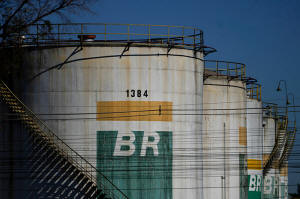Brazil's government greenlights oil drilling near mouth of Amazon River
ahead of UN climate summit
[October 21, 2025] By
MAURICIO SAVARESE
SAO PAULO (AP) — Brazil's government approved on Monday exploratory
drilling by state-run oil-giant Petrobras near the mouth of the Amazon
River. The decision comes only weeks before the United Nations climate
conference in Belem, COP30, where efforts to reduce the use of fossil
fuels will be discussed.
The Equatorial Margin deposit off the coast of Brazil, which stretches
from Brazil’s border with Suriname to a part of the country’s Northeast
region, is believed to be rich in oil and gas.
The biodiverse area is home to little-studied mangroves and a coral
reef, and activists and experts have said the project risks leaks that
could be carried widely by tides and imperil the sensitive environment.
Petrobras has long argued it has never caused spills in its drillings.
Petrobras said in a statement Monday that the drilling could start right
away and take up to five months. It requested to conduct the exploratory
drilling in block FZA-M-059, which lies 175 kilometers (108 miles)
offshore the northern Brazilian state of Amapa bordering Suriname. The
company added that the exploratory well will not produce any oil.

The decision was made by environmental regulator IBAMA, run by the
country's environment ministry. In May 2023, that same body declined to
grant Petrobras a license to drill in that region.
“After the refusal... IBAMA and Petrobras started an intense discussion
that allowed a meaningful improvement of the project, especially in its
structure of responding to emergencies,” the environmental regulator
said in a statement.
Energy Minister Alexandre Silveira celebrated the decision as a way to
defend “the future of our energy sovereignty.”
"Brazil cannot give up knowing its potential,” Silveira said on his
social media channels after the decision was announced. “We made a firm
and technical defense (of the drilling in the region) so we can assure
that the exploration takes place with complete environmental
responsibility, within the highest international standards and concrete
benefits for Brazilians.”
[to top of second column] |

Fuel reservoirs sit at a distribution center for state-run oil
company Petrobras, in Brasilia, Brazil, May 15, 2024. (AP Photo/Eraldo
Peres, File)
 In June, Brazil auctioned off
several potential land and offshore oil sites near the Amazon River,
as it aims to expand production in untapped regions despite protests
from environmental and Indigenous groups.
Nineteen offshore blocks were awarded to Chevron, ExxonMobil,
Petrobras and China National Petroleum Corporation. The oil
companies see the area as highly promising because it shares
geological characteristics with Guyana, where some of the largest
offshore oil discoveries of the 21st century have been made.
This region is considered to have high potential risk due to strong
currents and the proximity to the Amazon seashore. Block FZA-M-059
lies 500 kilometers (310 miles) north of the mouth of the Amazon
River.
Suely Araújo, a coordinator at the Climate Observatory, a network of
environmental nonprofit groups, said Brazil's government “acts
against humanity by stimulating more expansion of fossil (fuels),
and betting on more global warming.”
“It also harms COP30 itself, whose most important delivery needs to
be the gradual elimination of fossil fuels,” Araújo said in a
statement.
President Luiz Inácio Lula da Silva pushed for more use of biofuels
during his first two terms, from 2003 to 2010, but that standing
waned throughout those years after huge offshore discoveries close
to Rio de Janeiro state became a means of financing health,
education and welfare programs. The soon-to-be 80-year-old leftist
leader is widely expected to run for reelection next year.
All contents © copyright 2025 Associated Press. All rights reserved
 |